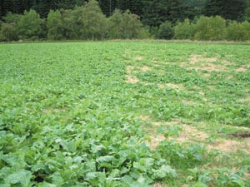
Flea beetles are devastating some late spring sown brassica fodder crops and farmers must remain vigilant to ensure kale, stubble turnip and swede sowings become successfully established, warns Michael Shannon from British Seed Houses.
"Adult flea beetles move into brassica crops when temperatures rise and the weather becomes drier. Late spring sowings in many regions of the country are now under severe threat because of the recent warmer weather and in some cases crop damage has been so bad that farmers have had to reseed," he points out.
Flea beetles feed on emerging brassica shoots, giving rise to the typical 'shot-holing' of leaves. Damage is more severe if soil conditions are dry.
Where crop damage is so severe that farmers have to reseed, Michael Shannon strongly recommends that brassica seed be treated to help provide some crop protection from flea beetle attack.
"Seed treatments like Ultrastrike contain a systemic insecticide, which delivers immediate protection of the seed once planted. The insecticide releases into the soil to protect the developing root zone and then moves into the plant to protect developing young leaves from the chewing activity of pests like flea beetles," Michael Shannon explains.
"However, systemic seed treatment is not a complete solution – under heavy flea beetle threat you may kill a lot of pests but crops can still suffer significant damage, so farmers must still remain vigilant and spray at the first sign of beetle activity."
